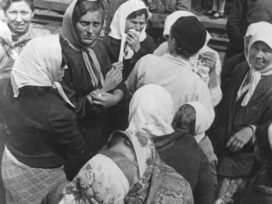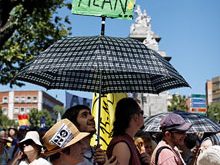A new EU data regulation directive fails to relax unduly tight restrictions on collecting and distributing data, writes David Erdos. Despite exemptions for use of private data in journalistic, artistic and research contexts, freedom of expression is still downgraded in European legislation.
Articles
Read more than 6000 articles in 35 languages from over 90 cultural journals and associates.
Mission accomplished?
Why cultural magazines need quotas for women
Literary and cultural magazines carry far fewer essays by women than by men. This has to do with the essay form itself as well as engrained male dominance in editorial processes, argues Lena Brandauer. Quotas for women in literary and cultural publishing are a feasible solution.
Budgeting for everyday life
Gender strategies, material practice and institutional innovation in nineteenth century Britain
Thrift represented an underlying drive shaping cultural priorities of men and women of different social classes in Britain from 1600 onwards, writes Beverly Lemire. In the nineteenth century, profound economic and social changes gave rise to institutional innovations that intersected with long established strategies of housewifery.
Differences between the Czech and Slovak national cultures begin with language and range from newspaper circulation to attitudes to corruption. Yet they don’t justify seeing the Czecho-Slovak split as blueprint for dismantling the EU, writes Martin Simecka.
Responding to Tony Judt’s appeal to the lost values of social democracy, Michael Ignatieff makes a strong argument for solidarity amidst recession, at the same time developing a version of progressive politics that emphasizes equality of opportunity and individual empowerment over both corporate and state-sector self-privileging.
‘The Romanian press is beyond salvation’
An interview with Mircea Vasilescu
Earlier this year, Eurozine partner Dilema Veche was almost dragged down with the rest of a failing Romanian print sector. But thanks to original journalism, inventive strategy and an independent attitude, the journal looks like pulling through all the stronger, says editor Mircea Vasilescu.
Moving the goalposts
An interview with British conceptual artist and writer Stewart Home
Situationism’s journey from its Parisian origins into Anglo-Saxon culture has been littered with feuds, schisms and excommunications. Writer and conceptual artist Stewart Home recalls the history and politics of Situationism and its British pendant, psychogeography.
Ideology never ends
An interview with sociologist Daniel Chirot
Eastern Europe as such was never “backward” and marginality is the least of the region’s problems, argues Daniel Chirot. While some countries have shaken off the “post-communist” tag, in others it remains apt; meanwhile, new disparities are generating a leftwing revival that show pronouncements of the end of ideology to have been rash.
Critique and crisis
Reinhart Koselleck's thesis of the genesis of modernity
The modern consciousness as crisis. This was Reinhart Koselleck’s premise in his famous study of the origins of critique in the Enlightenment and its role in the revolutionary developments of the late eighteenth century. A commentary on a work of historical hermeneutics whose relevance remains undiminished.

Continuities denied
Explaining Europe's reluctance to remember migration
Why does Europe find it so difficult to remember the facts of migration, both voluntary and forced? Reluctance to address the more noxious aspects of collective European identity impedes an engagement with migration history, argues Claus Leggewie.
Croatian novelist Dejan Sorak’s latest protagonist, a Machiavellian secret policeman, serves to critique the political system and ideological matrixes, writes Gjorgje Bozhoviq.
Even Ukrainian cultural journals have become the target of “raiders” – shady groups working on behalf of powerful interests who use bogus property claims to close down businesses. The biggest raider of all is the Yanukovych government itself, says Mykola Riabchuk.

Spaniards in their thirties have grown up in enviable circumstances: democracy, a generous state, material wellbeing. Now the crisis has returned them to a cruel reality: that they may have to live with less than their parents did. Whether they alter their expectations or try to stop the clock will be decisive, writes Ramón González Férriz.
‘O father, what have you done?’
Recovering the golden age of Yugoslavia's Roma music
Researching Yugoslav Roma music, Philip Knox and Nat Morris tour the Balkans in search of the real thing. They find it in Skopje, in the person of Esma Redzepova – the self-styled Queen of Gypsy music. From the ghetto to a Nobel prize nomination, Esma claims never to have produced “anything but Roma music of the utmost purity”.
Memory displaced
Re-reading Jean Améry's "Torture"
Jean Améry, writing in 1965, famously called torture “the essence of the Third Reich”. Why should Améry, the Holocaust survivor, have emphasized torture over the annihilation of the Jews? His choice can be understood in the context of French public debate on the Algerian war, argues Dan Diner.
The persistence of belief in witchcraft, illustrated by the tragic case of Kristy Bamu, stems from a notion within mainstream Christianity of evil as active, independent agent, argues Sarah Ditum. Yet is another battle against religion the best response?